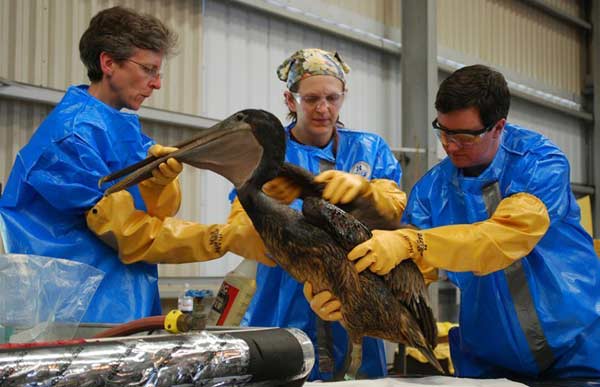BP blamed for slow response
Louisiana's governor on Sunday blamed energy giant BP and federal authorities for not acting swiftly to protect his state's coastlines from the massive Gulf oil spill.
 |
|
Workers are cleaning a sea bird on May 4, as a large amount of sea birds and animals are threatened by the oil slick. So far, the emergency measures taken to contain the oil spill in the Gulf of Mexico have proven to have little effect. There are still about 5,000 barrels of oil leaking into the gulf. U.S. president Barack Obama called the oil spill a massive and potentially unprecedented environmental disaster. [photo: www.163.com] |
Calling the delays "unacceptable," Governor Bobby Jindal said he was "frustrated" by the slow pace as the oil from a blown-out BP well in the Gulf of Mexico has been gushing into the sea for over a month.
"It is clear the resources needed to protect our coast are still not here: boom, skimmers, vacuums, jack-up barges are all in short supply," said Governor Bobby Jindal.
The spilled untold millions of gallons of oil since an offshore rig that exploded more than a month ago has posed a grave threat to the marshes and birds along the Louisiana coast.
Several pelicans were coated in oil on Barataria Bay off Louisiana, their usually brown and white feathers now jet black.
Wildlife officials tried to rescue oil-soaked pelicans Sunday, but they suspended their efforts after spooking the birds.
By using a mile-long tube, BP has collected more than half a million gallons of oil in the past week, but the process of sucking up is at a slower rate over the weekend, according to media report.
Some scientists have said they believe the spill already surpasses the 11 million-gallon 1989 Exxon Valdez oil spill off Alaska as the worst in U.S. history, though an initial BP estimate indicted 6 million gallons of crude have spewed into the Gulf.
The spill began after the Deepwater Horizon oil rig exploded off the coast of Louisiana on April 20, killing 11 workers; and the rig sank two days later.
 0
0 







Go to Forum >>0 Comments